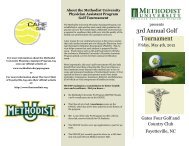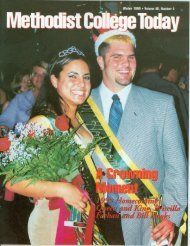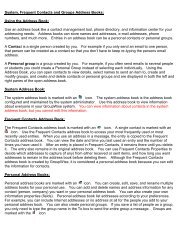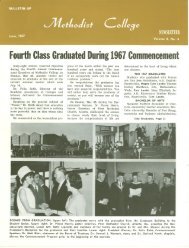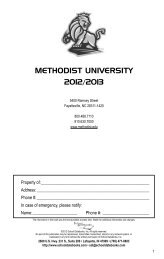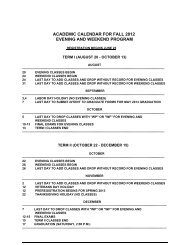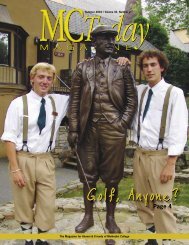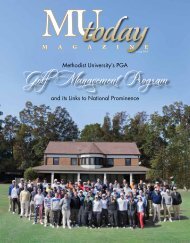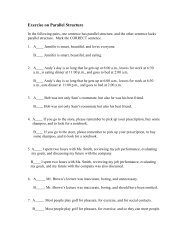Workshop 4: Misplaced Modifiers, Dangling Modifiers
Workshop 4: Misplaced Modifiers, Dangling Modifiers
Workshop 4: Misplaced Modifiers, Dangling Modifiers
You also want an ePaper? Increase the reach of your titles
YUMPU automatically turns print PDFs into web optimized ePapers that Google loves.
Presents:<br />
The Dirty Dozen<br />
<strong>Workshop</strong> Series
<strong>Workshop</strong> Four:<br />
<strong>Misplaced</strong> &<br />
<strong>Dangling</strong> <strong>Modifiers</strong>
Which sentence I is<br />
correct?<br />
I saw a sculpture next to the man<br />
with a moustache made of ice.<br />
I saw a sculpture made of ice next to<br />
the man with a moustache.
I saw a sculpture next to the man<br />
with a moustache made of ice.<br />
I saw a sculpture made of ice next<br />
to the man with a moustache.<br />
Why?<br />
The sculpture, not the moustache,<br />
is made of ice. The modifier,<br />
“made of ice,” must be placed as<br />
close as possible to what it is<br />
intended to modify.
<strong>Misplaced</strong> <strong>Modifiers</strong><br />
(mm)<br />
<strong>Misplaced</strong> modifiers are words that, because<br />
of awkward placement, do not describe what the<br />
writer intended them to describe. A misplaced<br />
modifier can make a sentence confusing or<br />
unintentionally funny.
<strong>Misplaced</strong> Modifier Examples<br />
We sold lemonade to the thirsty<br />
customers in paper cups.<br />
Were the customers in paper cups?<br />
Correct:<br />
We sold lemonade in paper cups to the thirsty customers.<br />
Rule of thumb: To avoid misplaced<br />
modifiers, place words as close as<br />
possible to what they describe.
<strong>Misplaced</strong> Modifier Examples<br />
I saw three bears on the way to class.<br />
Were the bears on their way to class?<br />
Correct: On the way to class, I saw three bears.<br />
She nearly combed her hair for ten<br />
minutes every night.<br />
Did she almost comb her hair but not?<br />
Correct:<br />
She combed her hair for nearly<br />
ten minutes every night.<br />
Psst! Words like almost, even, exactly, hardly, just, merely, nearly, only,<br />
scarcely, and simply should come immediately before the word they modify.
The following sentences have different<br />
meanings because of the placement of only.<br />
Only Kim offered me thirty dollars to wash her car.<br />
(Kim was the only person to offer thirty dollars.)<br />
Kim only offered me thirty dollars to wash her car.<br />
(Kim offered, but did not ultimately pay thirty dollars.)<br />
Kim offered me only thirty dollars to wash her car.<br />
(Kim offered thirty dollars, but I was expecting more.)
Checking for <strong>Misplaced</strong> <strong>Modifiers</strong><br />
1. Find the modifier.<br />
2. Make sure the modifier has<br />
something to modify.<br />
3. Make sure the modifier is as<br />
close as possible to the word,<br />
phrase, or clause it modifies.
Correcting <strong>Misplaced</strong> <strong>Modifiers</strong><br />
The farmer bought a bull at<br />
the auction with large horns.<br />
1. Find the modifier.<br />
The modifier is with large horns.<br />
2. Make sure the modifier has something to<br />
modify.<br />
The word being modified is bull.<br />
3. Make sure the modifier is as close as<br />
possible to the word being modified.<br />
Is the modifier as close as possible?
Nope. In this case, with large horns<br />
is not as close as possible to bull.<br />
Correct:<br />
The farmer bought a<br />
bull with long horns<br />
at the auction.
<strong>Dangling</strong> <strong>Modifiers</strong><br />
(dm)<br />
A dangling modifier is a modifier that<br />
does not relate sensibly to any word in the<br />
sentence. A modifier that begins a sentence<br />
must be followed immediately by the word it<br />
is meant to describe. Otherwise, the<br />
sentence takes on an unintended meaning.
(dm) Example<br />
While driving to the vet’s office,<br />
my dog jumped out of the car.<br />
Huh? Who was driving the car?
Correct:<br />
While I was driving to the vet’s office,<br />
my dog jumped out of the car.<br />
Also correct:<br />
While driving to the vet’s office, I saw<br />
my dog jump out of the car.
(dm) Example<br />
Asked to give an autograph, we were<br />
disappointed by the player’s refusal.<br />
Who was asked to give an autograph?
Correct:<br />
Asked to give an autograph, the player<br />
disappointed us because he refused.<br />
Also correct:<br />
When the player was asked to give an<br />
autograph, we were disappointed<br />
that he refused.
Tips for Spotting<br />
<strong>Dangling</strong> <strong>Modifiers</strong><br />
<strong>Dangling</strong> modifiers almost always<br />
include action verbs.<br />
In the previous examples, one modifier<br />
includes the word driving, and the other<br />
includes the verb asked.<br />
Not all dangling modifiers occur<br />
at the beginnings of sentences,<br />
but many of them do.
How to Check for<br />
<strong>Dangling</strong> <strong>Modifiers</strong><br />
1. Find the modifier.<br />
2. Make sure the modifier has something<br />
to modify.<br />
3. Make sure the modifier is as close as<br />
possible to the word, phrase, or clause<br />
it modifies.<br />
4. If the modifier has nothing to modify,<br />
add or change words so that it does.
(dm) Example<br />
While walking home, a<br />
car honked at me.
While walking home, a<br />
car honked at me.<br />
Step one: Find the modifier.<br />
The modifier is while walking home.<br />
Step two: Make sure the modifier has<br />
something to modify.<br />
The modifier cannot logically modify a car.<br />
Step three: Give the modifier something<br />
to modify.<br />
Who or what can it modify?
Correct:<br />
While I was walking home,<br />
a car honked at me.<br />
In this case, it would be appropriate to<br />
insert “I” for the modifier to modify.
In the following pairs, one<br />
sentence is correct, and the<br />
other sentence has a misplaced<br />
or dangling modifier.<br />
A) Biking down the hill, my tire deflated.<br />
B) As I was biking down the hill, my tire<br />
deflated.
A) Biking down the hill, my tire<br />
deflated.<br />
B) As I biked down the hill, my tired<br />
deflated.<br />
Why?<br />
Answer A is incorrect because my<br />
tire was not biking down the hill.
In the following pairs, one<br />
sentence is correct and the<br />
other sentence has a misplaced<br />
or a dangling modifier.<br />
A) Jack bought a spotted horse for his<br />
sister named Polka Dot.<br />
B) Jack bought a spotted horse named<br />
Polka Dot for his sister.
A) Jack bought a spotted horse for<br />
his sister named Polka Dot.<br />
B) Jack bought a spotted horse<br />
named Polka Dot for his sister.<br />
Why?<br />
Answer A is incorrect. The horse, not<br />
Jack’s sister, was named Polka Dot.
The following has a misplaced<br />
or dangling modifier. Identify<br />
and fix the error.<br />
I saw a huge lizard dropping off the<br />
ferrets at the vet’s office this morning.
Dropping off the ferrets at<br />
the vet’s office this morning,<br />
I saw a huge lizard.<br />
Why?<br />
The huge lizard was not dropping off the<br />
ferrets. I was dropping off the ferrets.
The following has a misplaced<br />
or dangling modifier. Identify<br />
and fix the error.<br />
Surfing this weekend, a shark ate<br />
my brother nearly.
Surfing this weekend, my<br />
brother was nearly eaten<br />
by a shark.<br />
Why?<br />
My brother was surfing, not the shark,<br />
and nearly is an adverb that must be<br />
closer to the verb.
While attending college, some of my instructors graded my<br />
papers very harshly. I remember one English teacher who gave a<br />
failing grade to any essay by a student with more than three<br />
spelling errors. I’ve always had trouble with spelling, and<br />
whenever writing compositions in class, my palms would sweat. I<br />
was supposed to look up any word in the dictionary that was<br />
misspelled, but I couldn’t always find the words I needed<br />
because, of course, I didn’t know how to spell them in the first<br />
place. However, after buying an electronic spelling dictionary, my<br />
composition grades improved. When using the electronic<br />
dictionary, even incorrectly spelled entries would give me the<br />
correctly spelled word. I would recommend using an electronic<br />
dictionary to any student in any class with a spelling problem.
While attending college, some of my instructors graded my<br />
papers very harshly. I remember one English teacher who gave a<br />
failing grade to any essay by a student with more than three<br />
spelling errors. I’ve always had trouble with spelling, and<br />
whenever writing compositions in class, my palms would sweat.<br />
I was supposed to look up any word in the dictionary that was<br />
misspelled, but I couldn’t always find the words I needed<br />
because, of course, I didn’t know how to spell them in the first<br />
place. However, after buying an electronic spelling dictionary,<br />
my composition grades improved. When using the electronic<br />
dictionary, even incorrectly spelled entries would give me the<br />
correctly spelled word. I would recommend using an electronic<br />
dictionary to any student in any class with a spelling problem.
Join us next time…<br />
Parallel Structure



